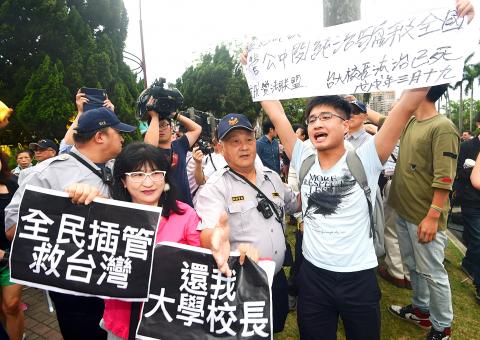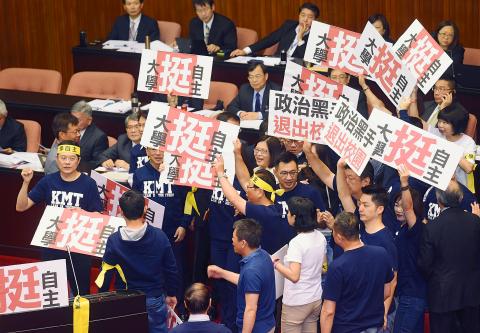Verbal clashes erupted on National Taiwan University’s (NTU) campus yesterday between students who support the election of Kuan Chung-ming (管中閔) as university president and those who oppose it.
The Ministry of Education on Friday last week rejected Kuan’s election after a series of allegations, ranging from conflicts of interest in the selection process to plagiarism and teaching in China, prevented Kuan from taking office as scheduled on Feb. 1.
The Action Alliance for University Autonomy, formed by a number of academics who support Kuan, held a rally on the campus near the landmark Fu Bell (傅鐘). Former president Ma Ying-jeou (馬英九) and former Chinese Nationalist Party (KMT) chairwoman Hung Hsiu-chu (洪秀柱) visited the campus to show their solidarity with faculty members and students supporting Kuan.

Photo: Liao Chen-huei, Taipei Times
Ma said that a university should not be polluted by politics, while Hung joined a sit-in.
At about 4pm, more than 20 NTU students who oppose Kuan’s election raised banners near the bell that read: “Kuan’s purity cheated the entire country.”
As the two sides traded barbs, a Kuan-supporter pulled the shirt collar of an anti-Kuan student, while another person drew on a student’s white shirt using lipstick.

Photo: Chu Pei-hsiung, Taipei Times
At one point, anti-Kuan students were cornered by people supporting the president-elect.
Some Kuan supporters were heard shouting: “Students get off the campus,” “Red Guards” and “Japanese lackey (日本走狗).”
Campus police intervened, separating the two parties to prevent the conflict from escalating.
NTU professor Chen Tung-sheng (陳東升) later yesterday said that if the university wants to ensure school autonomy, the first step would be to protect the personal safety of NTU students and teachers, and their freedom to express different opinions inside the campus.
“NTU students were beaten for expressing their opinion inside their own school — this is a very serious matter and the darkest day in NTU’s history,” Chen said.
The university’s acting president and administrative units must be held responsible for what happened and the people who used violence should be strongly condemned, he added.
Earlier yesterday, KMT lawmakers rallied outside the ministry to protest the ministry’s decision not to confirm Kuan as NTU president.
“On the 99th anniversary of the May Fourth Movement (五 四運動), the Democratic Progressive Party [DPP] administration has crossed the red line of democracy and academic freedom,” KMT caucus secretary-general Lee Yen-hsiu (李彥秀) said, referring to an intellectual and reformist movement in China.
The DPP has advocated against allowing politics to interfere in school affairs, but the charges it has fabricated against Kuan show that its so-called ideals are just tools for political struggle, Lee said.
School autonomy is crucial for young people to cultivate democratic values, and the KMT caucus wants to show its support for student protesters who yesterday took a stand on the issue at the NTU to let the DPP and the ministry know that they must not tread on the nation’s hard-won democracy and freedom, she said.
KMT caucus whip Lin Te-fu (林德福) accused President Tsai Ing-wen (蔡英文) and Premier William Lai (賴清德) of being the masterminds behind the ministry’s decision not to confirm Kuan.
The caucus did not stage the rally to rescue Kuan, but to call for support for university autonomy and democracy, KMT caucus deputy secretary-general William Tseng (曾銘宗) said.
There are 140 NTU faculty members who are also independent board directors, and most of them took up their posts in the private sector before informing the school — like what Kuan did when he accepted the Taiwan Mobile seat, Tseng said.
Lai yesterday told legislators that he would “take responsibility” for the ministry’s decision against confirming Kuan.
He made the remarks in response to KMT Legislator Alicia Wang’s (王育敏) question on whether the ministry had acted on his or Tsai’s orders, or whether the premier gave the order without first informing the president.
Lai said that, as the premier, he is responsible for the appointment of ministers, as well as the decisions they make.
Additional reporting by CNA

CHIP WAR: The new restrictions are expected to cut off China’s access to Taiwan’s technologies, materials and equipment essential to building AI semiconductors Taiwan has blacklisted Huawei Technologies Co (華為) and Semiconductor Manufacturing International Corp (SMIC, 中芯), dealing another major blow to the two companies spearheading China’s efforts to develop cutting-edge artificial intelligence (AI) chip technologies. The Ministry of Economic Affairs’ International Trade Administration has included Huawei, SMIC and several of their subsidiaries in an update of its so-called strategic high-tech commodities entity list, the latest version on its Web site showed on Saturday. It did not publicly announce the change. Other entities on the list include organizations such as the Taliban and al-Qaeda, as well as companies in China, Iran and elsewhere. Local companies need

CRITICISM: It is generally accepted that the Straits Forum is a CCP ‘united front’ platform, and anyone attending should maintain Taiwan’s dignity, the council said The Mainland Affairs Council (MAC) yesterday said it deeply regrets that former president Ma Ying-jeou (馬英九) echoed the Chinese Communist Party’s (CCP) “one China” principle and “united front” tactics by telling the Straits Forum that Taiwanese yearn for both sides of the Taiwan Strait to move toward “peace” and “integration.” The 17th annual Straits Forum yesterday opened in Xiamen, China, and while the Chinese Nationalist Party’s (KMT) local government heads were absent for the first time in 17 years, Ma attended the forum as “former KMT chairperson” and met with Chinese People’s Political Consultative Conference Chairman Wang Huning (王滬寧). Wang

CROSS-STRAIT: The MAC said it barred the Chinese officials from attending an event, because they failed to provide guarantees that Taiwan would be treated with respect The Mainland Affairs Council (MAC) on Friday night defended its decision to bar Chinese officials and tourism representatives from attending a tourism event in Taipei next month, citing the unsafe conditions for Taiwanese in China. The Taipei International Summer Travel Expo, organized by the Taiwan Tourism Exchange Association, is to run from July 18 to 21. China’s Taiwan Affairs Office spokeswoman Zhu Fenglian (朱鳳蓮) on Friday said that representatives from China’s travel industry were excluded from the expo. The Democratic Progressive Party government is obstructing cross-strait tourism exchange in a vain attempt to ignore the mainstream support for peaceful development

ELITE UNIT: President William Lai yesterday praised the National Police Agency’s Special Operations Group after watching it go through assault training and hostage rescue drills The US Navy regularly conducts global war games to develop deterrence strategies against a potential Chinese invasion of Taiwan, aimed at making the nation “a very difficult target to take,” US Acting Chief of Naval Operations James Kilby said on Wednesday. Testifying before the US House of Representatives Armed Services Committee, Kilby said the navy has studied the issue extensively, including routine simulations at the Naval War College. The navy is focused on five key areas: long-range strike capabilities; countering China’s command, control, communications, computers, cyber, intelligence, surveillance, reconnaissance and targeting; terminal ship defense; contested logistics; and nontraditional maritime denial tactics, Kilby